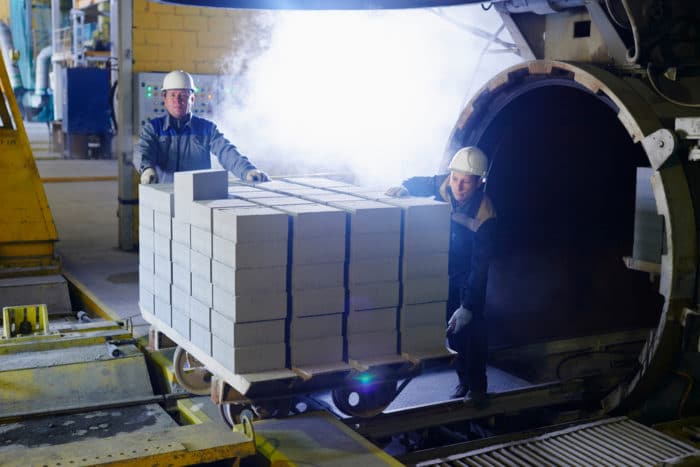Why We Love It
-
$36,970Potential Avg. Salary
-
-9.6%Job Growth Rate
-
Fast Paced CareerCareer Attribute
-
Flexible HoursCareer Attribute
A kiln operator is responsible for the monitoring a furnace or oven to process materials like wood, clay, rubber, glass, etc. to create unique products like bricks, pottery, tiles and tableware.
Recommended Schools
What is a Kiln Operator?
Duties
As a kiln operator, you will be in charge of the following duties:
- Keep track of gauges, meters, valves and other equipment to make sure they are in keeping with production and process guidelines.
- Uphold standard operating practices and report issues regarding quality, safety and hygiene to immediate supervisor.
- Promote a work environment that is supportive of continuous learning, developing your own skillset and assisting other staff to do the same.
- Conduct research on different processing methods and test properties of materials to refine existing techniques or establish a new process.
- Assess product items for defects and prepare them for storage, shipping or further processing.
Day in the Life
As a kiln operator, you will program the kiln as per specific requirements such as the type of material or product. There is a precise temperature and duration at which every product should be fired. It is up to you to closely monitor these controls and remove excess waste from the kiln once the firing process is complete. Regular communication with other kiln operators on your team is important, as is updating your immediate supervisor on any housekeeping issues. Through your career, you will also spend some time familiarising yourself with new techniques and the wide range of kilns that are present in different industries. It is vital to use every equipment carefully and accurately to create good quality products.
Work Schedule
Kiln operators work up to 40 hours every week, on different shifts. Workers may have to take on one of three shifts: morning, night, or graveyard. Those working at odd hours also get premium pay, as do those working overtime (more than 40 hours per week), weekends or on holidays.
Since the work is done in a production plant or factory, expect the environment to be hot, noisy and lacking regular maintenance. You must wear protective clothing or equipment for safety reasons. Your job may also require you to operate various machines such as computers, transportation tools, forklifts and coal mills. Workplace accidents are not uncommon as you may work in proximity to large machines and molten metal. Most kiln operators take protective measures such as wearing fireproof clothes or safety masks that lower the risk of inhaling fine particles.
Growth of the Job
Once you gain sufficient experience, you are promoted to positions such as kiln supervisor, production manager, etc. Further training can also help you become a maintenance professional, specialising in cleaning, repairing and servicing all kinds of kilns. Opportunities are to be more positive for workers employed at electronic arc furnace mills, which are more cost-effective than traditional steel mills. Some professionals branch off to alternate careers such as machine setting, painting or spraying machine setter, field production technician, production helper, wood product engineer or ceramics designer maker.
Typical Employers
Kiln operators are hired for sites such as rubber and industrial manufacturing, material processing, lumber, glass and clay industries, craft workshops and educational institutions.
New job openings will result due to growing prospects and the turnover from employees that are leaving. You can find potential job opportunities with leading companies like Interfor Corporation, Trinity Industries, Calgon Carbon Corp and API Technologies Corp.
Recommended Schools
How To Become a Kiln Operator
Formal education requirements are not a necessity when aspiring to become a kiln operator. You will likely be trained in the foundational principles of the work on-the-job. However, getting certified from a technical school or honing your background in a relevant field such as industrial manufacturing will place you ahead of the competition.
Classes you should complete at the high school level include mathematics, computers, English, communications, general and mechanical drawing as well as shop courses. There are also some educational institutions that provide short-term programs in kiln operations – this includes cooling and firing processes, safety policies and regulations, kiln drying methods in different industries, mechanical components of kilns, etc.
Besides your educational background, employers value workers that are comfortable handling heavy objects, kneeling, bending and standing for long time periods in an extremely hot environment. Thus, being physically fit and enjoying practical labour is a must if you are interested in becoming a kiln operator. You should also cultivate a high attention to detail and superior problem-solving skills since much of the work takes place under minimum supervision.
Kiln Operator Salary Data
We’ve provided you the following to learn more about this career. The salary and growth data on this page comes from recently published Bureau of Labor Statistics data while the recommendations and editorial content are based on our research.
National Anual Salary
Low Range
$27,890Average
$36,970High Range
$55,000National Hourly Wage
Low Range
$13/hrAverage
$18/hrHigh Range
$26/hrHow do Kiln Operator salaries stack up to other jobs across the country? Based on the latest jobs data nationwide, Kiln Operator's can make an average annual salary of $36,970, or $18 per hour. This makes it an Above Average Salary. On the lower end, they can make $27,890 or $13 per hour, perhaps when just starting out or based on the state you live in.
Salary Rankings And Facts
#585 Nationally for All Careers
Highest Education Among Kiln Operators
- 0% Doctorate
- 1.8% Masters
- 6.1% Bachelors
- 8% Associates
- 22.7% College
- 45.3% High School
- 16% Less than High School
Job Growth Projections and Forecast
2014 Total Jobs
20,9002024 Est. Jobs
18,900Job Growth Rate
-9.6%Est. New Jobs
-2,000How does Kiln Operator job growth stack up to other jobs across the country? By 2024, there will be a change of -2,000 jobs for a total of 18,900 people employed in the career nationwide. This is a -9.6% change in growth over the next ten years, giving the career a growth rate nationwide of Below Average.
Growth Rankings And Facts
#747 Nationally for All Careers
What Companies Employ The Most Kiln Operators
| Industry | Current Jobs | New Jobs Needed | % Increase |
|---|---|---|---|
| Glass and glass product manufacturing | 3,400 | -700 | -1% |
| Clay product and refractory manufacturing | 2,200 | -400 | 0% |
| Rubber product manufacturing | 1,400 | -200 | 0% |












